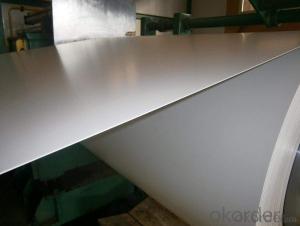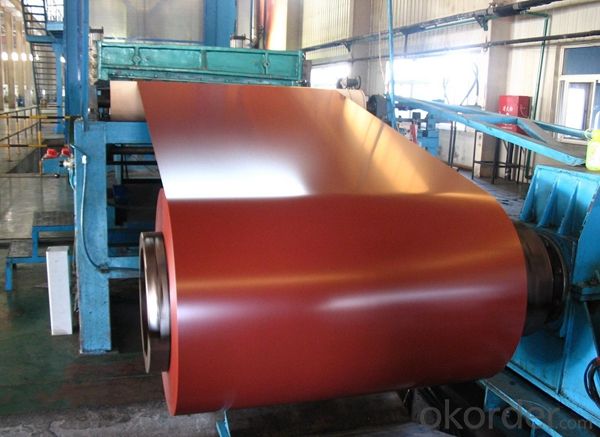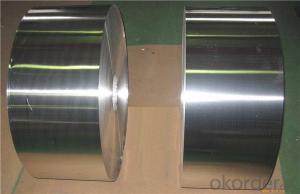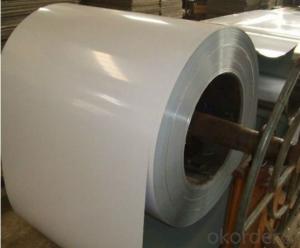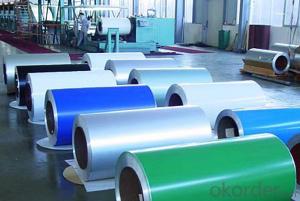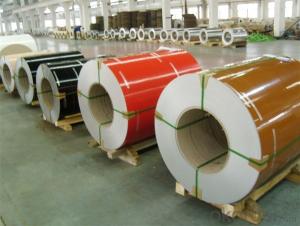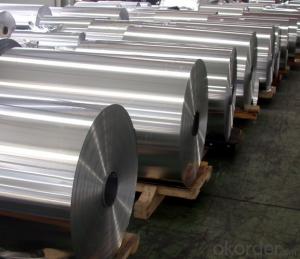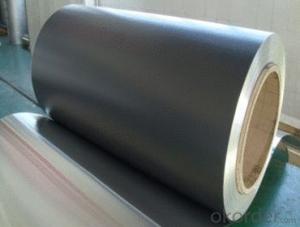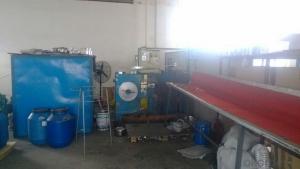Best Line Aluminum Coil - Color Coating Aluminum Coil PVDF Painting for Curtain Wall
- Loading Port:
- Shanghai
- Payment Terms:
- TT OR LC
- Min Order Qty:
- 5 m.t.
- Supply Capability:
- 10000 m.t./month
OKorder Service Pledge
OKorder Financial Service
You Might Also Like
Specification
1. Specification of Color Coating Aluminium Coil PVDF Painting for Curtain Wall
Material | Alloy Aluminum 1XXX,3XXX,5XXX or customer nominated |
Temper | T3, T4, T5, T6 |
Surface | Anodize, electrophoresis, powder coating,PVDF coating, wood grain painting, matted, etc. |
Colour | Any colour based on Standard Germany RAL Mark |
Length | Coating 6.5 meters, Anodizing 6.5 meters, Mill finish 5 meters |
Press Machine | 500-4000 tons all together 64 press lines. |
Fabrication | 1. Windows and doors; 2. Drilling; 3. Bending; 4. Cutting; 5. etc. |
Certificate | ISO 9001 |
Moulding | 1. Using our moulds, no fee; |
2. Using customer drawing, opening mould, usually about 10~50 tons then the moulding can be refunded. | |
3. Mould cost is negotiable base on the order quantity | |
Capability | Annual output 100,000 tons |
2. Application of Color Coating Aluminium Coil PVDF Painting for Curtain Wall
(1).Interior: wall cladding, ceilings, bathrooms, kitchens and balconies, shutters, doors...
(2).Exterior: wall cladding, facades, roofing, canopies, tunnels,column covers , renovations...
(3).Advertisement: display platforms, signboards, fascia, shop fronts...
3. Feature of Color Coating Aluminium Coil PVDF Painting for Curtain Wall
Be free from Oil Stain, Dent, Inclusion, Scratches, Stain, Oxide Dicoloration, Breaks, Corrosion, Roll Marks, Dirt Streaks and other defect which will interfere with use
4. Certificate:
SGS and ROHS(if client request, paid by client), MTC(plant provided), Certificate of Origin(FORM A, FORM E, CO), Bureau Veritas and SGS (if client request, paid by client), CIQS certificate
5. Image of Color Coating Aluminium Coil PVDF Painting for Curtain Wall
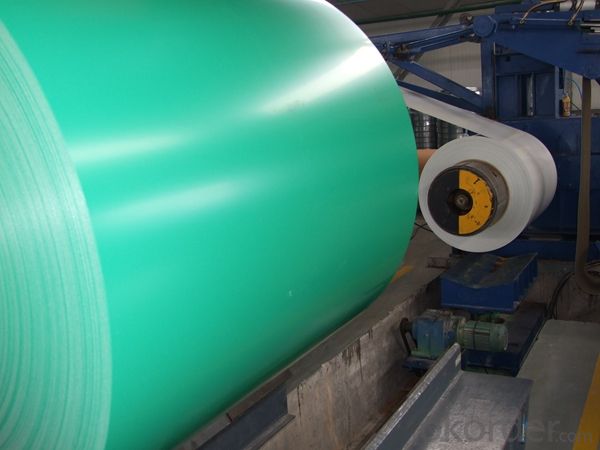
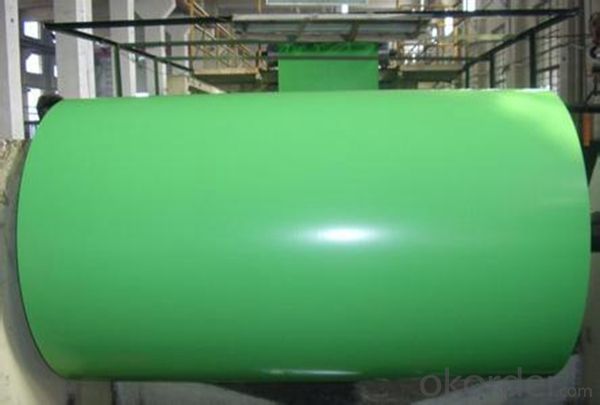
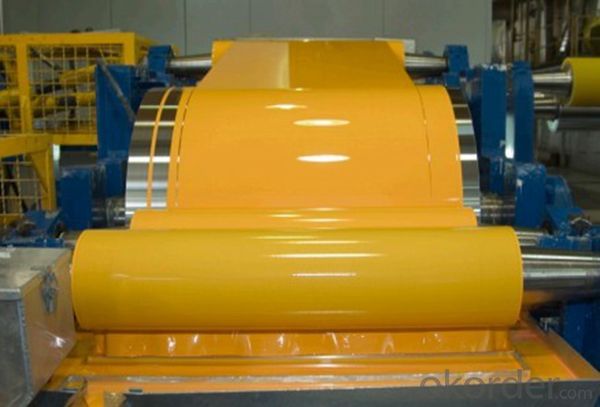
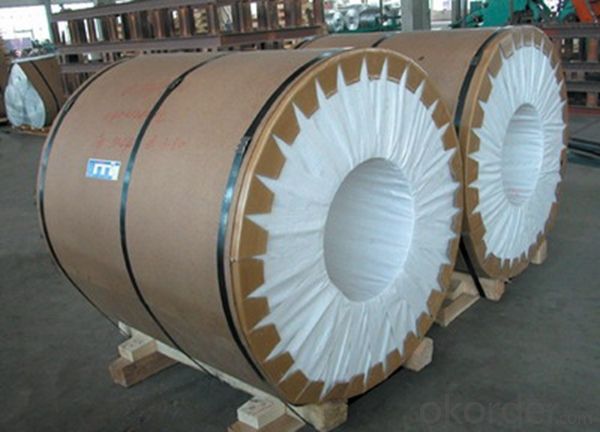
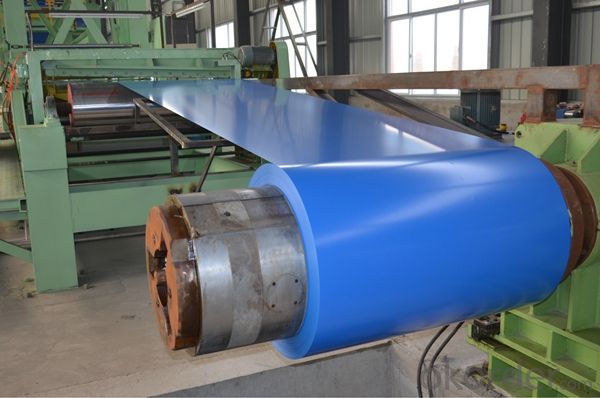
6. Package and shipping of Color Coating Aluminium Coil PVDF Painting for Curtain Wall
eye to wall
eye to the wall
with wood pallet (wooded case also available)
7. FAQ
1) What is the delivery time?
Dpends on actual order, around 20 to 35 days
2)What is the QC system:
We have QC staff of 20 persons and advanced equipment, each production is with MTC traced from Aluminum ingot lot.
3) What market do you mainly sell to?
Australia, America, Asia, Middle East, Western Europe, Africa etc
- Q: Can aluminum coils be used in high-radiation environments?
- Aluminum coils can be used in high-radiation environments, but their performance and durability may be affected depending on the level of radiation exposure. Aluminum is a relatively good conductor of heat and electricity, making it a suitable material for many applications, including coil systems. However, when exposed to high levels of radiation, aluminum can become more susceptible to degradation and corrosion. In high-radiation environments, the primary concern is the potential for radiation-induced damage to the material. Aluminum is considered to have relatively low radiation resistance compared to other metals, such as stainless steel or titanium. As a result, prolonged exposure to high radiation levels can lead to structural changes, including embrittlement and loss of mechanical properties. To mitigate these risks, several factors need to be considered. The specific radiation level, duration of exposure, and the intended application of the aluminum coils are critical in determining their suitability for use in high-radiation environments. Additionally, protective coatings or treatments can be applied to enhance the radiation resistance of the aluminum coils, increasing their durability and longevity. Ultimately, the decision to use aluminum coils in high-radiation environments should be based on a thorough assessment of the radiation levels, the potential risks, and the specific requirements of the application. Consulting with radiation experts and considering alternative materials may be necessary to ensure the best performance and safety in such demanding conditions.
- Q: What is the price range of aluminum coils?
- Aluminum coil prices can fluctuate depending on a range of factors including thickness, width, alloy type, and market conditions. Typically, the price range for aluminum coils can begin at $1 per pound for thinner gauge coils and can rise to $3 per pound or more for thicker gauge coils or specific alloys. It is crucial to understand that these prices are estimated and subject to change based on market demand, availability, and other economic influences. To obtain accurate and current pricing information, it is advised to reach out to suppliers or refer to market research reports.
- Q: How are aluminum coils cut and shaped?
- Aluminum coils are cut and shaped using various methods and tools, depending on the desired shape and size. The most commonly used techniques include slitting, shearing, and laser cutting. Slitting is the process of cutting a wide coil into narrower strips. It involves feeding the coil through a set of circular blades that make precise cuts along the length of the coil. This method is commonly used to produce thin strips of aluminum that are then further processed or used in various applications. Shearing is another common method used to cut aluminum coils. It involves using a machine with a moving blade to cut through the coil. The blade applies pressure to the coil, resulting in a clean and straight cut. Shearing is often used for cutting thicker aluminum coils and is suitable for producing straight cuts without any deformation. Laser cutting is a more advanced technique used to cut and shape aluminum coils. It involves using a high-powered laser beam to melt or vaporize the metal along a predetermined path. This method offers high precision and allows for complex shapes and designs to be cut into the aluminum. Laser cutting is commonly used in industries where intricate and detailed cuts are required. After the cutting process, the aluminum coils can be further shaped using various methods such as bending, rolling, stamping, or forming. These techniques allow the aluminum to be shaped into different geometries and forms according to the specific requirements of the desired application. Overall, the cutting and shaping of aluminum coils involve a range of techniques and tools, each suited for different requirements. The chosen method depends on factors such as the thickness of the coil, the desired shape, and the precision needed for the final product.
- Q: Do aluminum coils require any special maintenance?
- Yes, aluminum coils do require special maintenance. Regular cleaning and inspection are necessary to ensure their optimal performance. This includes removing any debris or dirt buildup, checking for any signs of corrosion, and ensuring proper airflow around the coils. Additionally, it is important to follow manufacturer's recommendations for maintenance to prolong the lifespan of the coils.
- Q: Can aluminum coils be anodized?
- Indeed, it is possible to anodize aluminum coils. Anodizing, an electrochemical technique, enhances the existing oxide layer on the aluminum's surface, rendering it denser, sturdier, and more resistant to corrosion. This particular process finds widespread usage in aluminum sheets, plates, and coils. Anodizing can be effectively employed on both flat and shaped aluminum coils, imparting them with a plethora of appealing hues and finishes. Furthermore, the anodized coating significantly improves the aluminum's capacity to accommodate paint and adhesives, thereby rendering it a highly sought-after option for numerous applications, including architectural cladding, automotive trim, and electronic components.
- Q: Is it possible to utilize aluminum coils in the construction of solar panels or wind turbines?
- <p>Aluminum coils can be used in the construction of both solar panels and wind turbines, but not as the primary material for energy conversion. In solar panels, aluminum is often used for framing and mounting structures due to its lightweight and corrosion-resistant properties. For wind turbines, aluminum is utilized in the manufacturing of certain components such as nacelle shells and towers, but the main rotor blades are typically made from composite materials for their strength and aerodynamic properties. Thus, while aluminum plays a supportive role in these renewable energy technologies, it is not the core material for capturing solar or wind energy.</p>
- Q: What are the weight ranges of aluminum coils?
- The size and thickness of aluminum coils determine their weight ranges, which can vary greatly. Aluminum coils can weigh anywhere from a few hundred pounds to several thousand pounds. Coils used for household purposes or in manufacturing small parts usually weigh around 100-500 pounds. Coils commonly used in construction or automotive industries range from 500-2,000 pounds. On the other hand, larger coils utilized in heavy-duty applications like aerospace or marine industries can exceed 2,000 pounds and sometimes even surpass 10,000 pounds. It is important to emphasize that these weight ranges are approximate and can differ based on the specific requirements of a particular project or application.
- Q: This question asks about the environmental impact of aluminum coils, which are commonly used in various industries.
- <p>Aluminum coils have both positive and negative environmental impacts. On the positive side, aluminum is highly recyclable, and its use in coils reduces the need for raw material extraction, thus conserving natural resources. The recycling process also consumes less energy compared to primary aluminum production, reducing greenhouse gas emissions. However, the production of aluminum coils involves energy-intensive processes that can contribute to carbon emissions. Additionally, if not properly managed, the waste from aluminum production can pollute water bodies and soil. Overall, the environmental impact depends on the balance between recycling and production practices, as well as waste management.</p>
- Q: should i have a paper between aluminum siding and the wood
- Aluminum siding can be vented with round pop-in perforated vent plugs, these are very easy to install. I would really like to know how do you know there is condensation behind your siding?
- Q: How are aluminum coils protected against corrosion?
- Aluminum coils are protected against corrosion through various methods. One common method is the application of a protective coating or finish on the surface of the coil. This coating acts as a barrier, preventing the contact of the aluminum surface with moisture, oxygen, and other corrosive elements present in the environment. The coating can be a layer of paint, anodizing, or a specialized protective film. Another method used for protecting aluminum coils against corrosion is the process of alloying. By adding small amounts of other metals such as copper or zinc to the aluminum, it enhances the corrosion resistance of the alloy. These alloyed metals create a protective oxide layer on the surface of the aluminum, which acts as a shield against corrosion. In addition to coatings and alloying, proper cleaning and maintenance of aluminum coils are crucial for preventing corrosion. Regular cleaning helps remove any contaminants or corrosive substances that may have accumulated on the surface of the coils. This ensures that the protective coatings or oxide layers remain intact and effective in preventing corrosion. Furthermore, proper installation and sealing of aluminum coils are essential to protect them against corrosion. Effective sealing prevents moisture or other corrosive agents from entering the coil's interior, which can lead to corrosion over time. Overall, a combination of protective coatings, alloying, regular cleaning, and proper installation techniques play a vital role in safeguarding aluminum coils against corrosion, ensuring their longevity and optimal performance.
Send your message to us
Best Line Aluminum Coil - Color Coating Aluminum Coil PVDF Painting for Curtain Wall
- Loading Port:
- Shanghai
- Payment Terms:
- TT OR LC
- Min Order Qty:
- 5 m.t.
- Supply Capability:
- 10000 m.t./month
OKorder Service Pledge
OKorder Financial Service
Similar products
Hot products
Hot Searches
Related keywords
